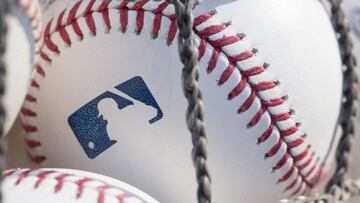What are the new rules for the 2024 MLB season? Pitching changes, runner ‘s lane...
Much has been made about MLB’s rule changes ahead of the 2024 season, but what are they and how will they affect the game? Join us for the breakdown.


With the start of the 2024 MLB season a little less than three months away, discussion surrounding the league’s rule changes has intensified. While these changes are essentially a continuation from the ones that were instituted last year, they have served to divide fans and players alike as to their effectiveness. Let’s take a look.
MLB’s rule changes for 2024
Seen as a means to making the game more efficient and safer for players, MLB has followed on from the changes that it instituted last year with what can be considered a few tweaks to the state of play. Of these ‘changes’, perhaps the biggest of them are those which concern the pitch clock, and the runner’s lane but rest assured there are a few others to consider as well.
OK, what’s happening with the pitch clock?
In short form, when runners are on base the pitch clock will be quicker. To be more specific, the clock is being reduced from 20 seconds to 18 seconds. Typically, pitchers begin their delivery with roughly 7.3 seconds remaining on the clock as we saw in 2023. The thinking here is to increase the speed of play. It’s worth noting that pitchers will still be allowed to step off the mound to reset the clock twice before incurring a penalty. Interestingly, violations with runners on base were the least frequent at 14% of all violations in 2023.
MLB Rule Change Impact, 2022 to 2023 pic.twitter.com/LxXBxcQAHQ
— Dan Bartels (@DanBartels2) February 24, 2024
So, the runner’s lane has been widened?
Yes, it has. According to reports, “The Runner’s Lane will be widened to include the dirt area between the foul line and the infield grass. Widening the lane allows batters to take a more direct path to first base while retaining protection from interference. The distance between the foul line and the infield grass will be between 18 and 24 inches in all parks, with some limited grace periods granted by MLB due to difficulty in modifying the field (e.g., synthetic turf field).” As you can imagine, this change will offer runners a more direct route to base, while reducing the danger of being called for interference.
Mound visits and a few other tweaks to consider
Another topic that has been at the center of the ‘pace of play’ debate is that of ‘mound visits.’ Heading into the 2024 season, the league appears to be intent on being much stricter with the amount of times that a team can visit the mound. Previously, that number was five but will now be reduced to four. That said, teams will still be given one extra visit which can be used during the 9th inning. Interestingly, catchers will be permitted to take advantage of the mound visits i.e., they can call for a mound visit to avoid clock violations but don’t have to approach the mound formally.
Related stories

Ohtani off to a flying start
This brings us to the topic of relievers who will now have to be far more efficient in their warm-ups. As fans will know, players typically had two minutes and 15 seconds. The time will now be two minutes flat and that includes the amount of time needed to leave the bullpen itself. We’ve also got to touch on the topic of foul balls. That’s to say, from now on the pitch clock will start only when the pitcher has the ball and all fielders are back in position. Speaking of the pitcher, should one warm up at the start of an inning he will have to face at least one batter. Indeed, pitchers must now remain in the game even if the batting team changes the lineup.
CBS Sports Radio Columnist @j_stern97 joins @DHenryTV to talk about MLB improving the fan viewing experience with his potential rule changes in the future https://t.co/Cyyiz10Nlg pic.twitter.com/b0Q1AsO8Os
— New York Post Sports (@nypostsports) February 25, 2024
In keeping with that, the league has also amended the process of changing the pitcher itself. How, you ask? If a new pitcher steps onto the warning track with less than 2:00 minutes remaining on the inning break clock, the clock resets to 2:00 minutes rather than 2:15 as we saw last season. For perspective, inning breaks that contained a pitching change averaged 2 minutes and 35 seconds in 2023. Why does that matter? For starters, broadcasters are only guaranteed two minutes of commercial time, which understandably leads to viewers at home being returned to the broadcast after play has already resumed. Again, many of MLB’s alterations have been largely cosmetic and it’s interesting to note that the player representatives actually voted against the proposed rule changes when the vote was taken last year. Nonetheless, what’s done is done.

Complete your personal details to comment